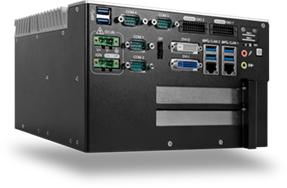We've all had that experience of looking at a computer screen only to be distracted by noticing the dust clinging to its surface. Maybe you ignore it and go on with your work or try to brush it away with the sleeve of your shirt. But while you're distracted by the particles on your monitor, you're probably not considering the dust and grime infiltrating your PC's case.
Dust is far more than a minor aesthetic annoyance; if it isn't regularly cleaned away, it can seriously threaten the functionality and safety of your PC. Alternatively, you can invest in PCs designed with dust protection in mind.
How does dust affect a PC?
The first step to preventing a threat is understanding the danger that it poses. A typical PC, which relies on fans to blow hot air away and cool its components, will gradually pull in dust from its surrounding environment. As this goes on, dust can build up more and more, eventually clinging to air filters and making it more difficult to dissipate heat.
If dust is allowed to settle on the circuit board or other components, it acts as an insulator, trapping heat and making overheating even more likely. At worst, it can cause an electrical short, leading to a computer short or even a fire.
Even outside of the circuit board, dust can interfere with other parts of a PC, such as clogging up a disk drive and preventing it from spinning effectively. It can also interfere with I/O ports, making it impossible to plug peripheral devices into them.
The Signs of Dust Build-Up
Part of being a responsible computer owner includes monitoring for the signs of dust build-up. These include:
- The computer's fan sounds louder than usual. This is because it is running at a higher speed than usual to try to blow cool air over the PC, but it is failing due to the dust present.
- The computer feels hot to the touch. If your PC's case feels unusually warm, it may be a warning sign that your computer's cooling system can't keep up with the dust inside. There are free programs online that you can download that will measure the temperature of your PC's components as well.
- You can visibly see the dust on the computer. If you can see dust and grime collecting on your PC's vents and ports, it is highly likely that deposits are building inside the case.
How to Clean Dust From Your PC
Fortunately, cleaning dust out of a computer is a relatively simple task that doesn't require specialized training to perform.
- Purchase a can of compressed air designed for cleaning out PCs. These cans are pressurized specifically to blow dust away without disrupting or damaging the more delicate parts of a PC.
- Turn off the computer, unplug it, and wait for roughly half an hour as it cools down completely.
- Take the PC to a well-ventilated area, such as outdoors or a large garage and open the case.
- Remove the largest chunks of dust and grime by hand (you may want to wear gloves for this part). You can also use cotton swabs and microfiber cloths to wipe these clumps away. During this stage, you can also disassemble the PC, taking individual parts out to clean them separately. If you do, make sure to wear an anti-static wristband! This will prevent any lingering static charge in your body from affecting the components.
- Use the compressed air can to spray down the vents, fans, CPU, heat sinks, I/O ports, and any other nooks and crannies where dust can hide.
- Reinstall any components you removed, close the case, plug your PC back in, and go back to using it as usual.
How often you clean a computer will depend on its operating environment. For instance, a normal office computer will only require cleaning once a year or so. Areas with lots of airborne particles, such as construction sites and industrial complexes, will require more frequent cleaning.
The Alternative: Fanless PCs
If you'd prefer to avoid dust clogging your PC entirely, consider investing in a fanless computer. Rugged mini PCs with fanless cooling rely on heatsinks to dissipate heat. This removes the need for vents to cycle air through the PC's case, which makes it far more difficult for dust to get inside. In fact, industrial-grade panel PCs typically feature IP65-rated front bezels, meaning they are completely dust-proof from the front.
Fanless PCs also use less power, come in smaller sizes, and are more reliable since they don't have as many moving parts.
Reliable Fanless Industrial PCs from Cybernet Manufacturing
Dust build-up is perhaps the most common issue for PC users across every industry and sector, which means it is essential for owners to understand the threat it poses and how to counter it. Alternatively, you can invest in fanless PCs that almost entirely negate the dust issue.
If you're looking for computers that are well-protected against dust, contact the team at Cybernet Manufacturing. Our industrial and medical-grade PCs are fanless and feature IP65-rated front bezels, preventing dust from ever entering the case and causing issues to begin with.
Join the conversation and connect with us on this and other relevant topics - Follow us on Facebook, Twitter, Instagram, LinkedIn, TikTok, and YouTube.

